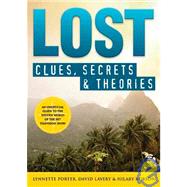
| Acknowledgments | p. VII |
| Introduction | p. 1 |
| Lost Reading and Viewing | p. 7 |
| Is There an (Ancestor) Text on This Island? | |
| Books on the Island | |
| After All These Years | |
| Are You There, God? It's Me, Margaret | |
| Bad Twin | |
| The Bible | |
| Book of Law | |
| A Brief History of Time | |
| The Brothers Karamazov | |
| Carrie | |
| Catch-22 | |
| Dirty Work | |
| Evil Under the Sun | |
| The Fountainhead | |
| The Gunslinger | |
| Hindsight | |
| Lancelot | |
| Laughter in the Dark | |
| Left Behind | |
| "An Occurrence at Owl Creek Bridge" | |
| Our Mutual Friend | |
| Rainbow Six | |
| The Third Policeman | |
| The Turn of the Screw | |
| Watership Down | |
| A Wrinkle in Time | |
| Ancestor Texts | |
| Alice's Adventures in Wonderland | |
| "The Damned Thing" | |
| Death and the Maiden | |
| The Epic of Gilgamesh | |
| Lord of the Flies | |
| The Odyssey | |
| Of Mice and Men | |
| The Outsiders | |
| "A Psychological Shipwreck" | |
| Robinson Crusoe | |
| Solaris | |
| The Songlines | |
| The Stand | |
| Stranger in a Strange Land | |
| Walden Two | |
| Must-See TV and Essential Movies | |
| The Adventures of Brisco County, Jr. | |
| Alias | |
| Buffy the Vampire Slayer/Angel/Firefly | |
| Cast Away | |
| Crossing Jordan | |
| Disaster Movies | |
| Forbidden Planet | |
| Gilligan's Island | |
| Jurassic Park | |
| The Langoliers | |
| Lost Horizon | |
| Nash Bridges | |
| The Prisoner | |
| Survivor | |
| To Kill a Mockingbird | |
| The Twilight Zone | |
| Twin Peaks | |
| The Wizard of Oz | |
| The X-Files | |
| Lost Playlist | p. 141 |
| The Singing Castaways | |
| Channeling the Dead | |
| Modern Music | |
| Making the Band | |
| The Genius of Michael Giacchino | |
| Between the Lines: Lost and Popular Culture | p. 187 |
| The Hurley-Sawyer Connection | |
| The Power of Popular Culture | |
| Lost as Reflector and Creator of Popular Culture | |
| The Science, Pseudo-Science, and Social Science of Lost | p. 221 |
| Anger Management | |
| Astral Projection | |
| Behaviorism | |
| CPR | |
| Electromagnetism | |
| E.S.P. | |
| Faith Healing | |
| Geodesic Dome | |
| Heuristics | |
| Lacanian Psychology | |
| Nanotechnology | |
| Obstetrics and Gynecology | |
| Parallel Universes | |
| Parapsychology | |
| String Theory | |
| Telekinesis | |
| Utopias and Dystopias | |
| The Significance of Place | p. 233 |
| Home Towns and Special Places | |
| Common Destinations | |
| Geographic Connections | |
| Hawaii as a Character | |
| Outside Honolulu | |
| Around Honolulu | |
| The Art of Selecting Locations and Dressing Sets | |
| Giving Back to the Community | |
| Playing Games | p. 279 |
| A Puzzling Mystery | |
| The Lost Strategy | |
| Video and Mobile Games | |
| The Lost Alternate Reality Game | |
| Behind the Scenes | p. 305 |
| The Cast | |
| Lost Writers | |
| Lost Directors | |
| Top 10 Lists | p. 325 |
| 10 Books/Essays to Read about Lost | |
| Top 10 Movies and Television Series for Lost Fans | |
| Top 10 Lost Websites | |
| Top 10 Lost Conspiracy Theories | |
| Top 10 Images/Symbols on Lost | |
| 10 Reasons Why Lost Is or Is Not Science Fiction | |
| The Authors' 10 Favorite Episodes | |
| Bibliography | p. 347 |
| Notes | p. 357 |
| Index | p. 367 |
| About the Authors | p. 376 |
| Table of Contents provided by Ingram. All Rights Reserved. |
The New copy of this book will include any supplemental materials advertised. Please check the title of the book to determine if it should include any access cards, study guides, lab manuals, CDs, etc.
The Used, Rental and eBook copies of this book are not guaranteed to include any supplemental materials. Typically, only the book itself is included. This is true even if the title states it includes any access cards, study guides, lab manuals, CDs, etc.
Excerpted from Lost's Buried Treasures: The Unofficial Guide to Everything Lost Fans Need to Know by Lynnette Porter, David Lavery, Hillary Robson
All rights reserved by the original copyright owners. Excerpts are provided for display purposes only and may not be reproduced, reprinted or distributed without the written permission of the publisher.